D | Player Pics | A-Z of Players
Personal
Fullname: James Delaney
aka: Jimmy Delaney
Born: 3 Sep 1914
Died: 26 Sep 1989
Birthplace; Cleland (Lanarkshire), Scotland
Height: 5 ft 8
Signed: 9 Sep 1933
Left: 8 Feb 1946 (to Man Utd)
Position: Outside Right, Centre Forward
Debut: Hearts 0-0 Celtic, League, 18 Aug 1934
Internationals: Scotland
International Caps: 19 caps
International Goals: 10 goals
Biog 
As immensely charming as he was talented, the noble Jimmy Delaney is unquestionably one of the best loved Celts of all time.
The son of Patrick and Bridget, James Delaney was born in the small north Lanarkshire village of Cleland on 3rd September 1914. Cleland was a mining community and one which boasted a close knit and almost exclusively Irish populace. Like many of his contemporaries Jimmy would work as a young teen in the pits but it would soon be obvious to most that here was a man destined for a life on the football field rather than the coalfield.
Delaney’s career would begin with local side St.Mary’s, and it wasn’t long before he made the step up to the Midlothian Junior League by signing for Stoneyburn Juniors in the summer of 1933. His performances for Stoneyburn quickly attracted the attention of scouts and eventually sparked a race for his signature between the Hoops and Hibernian.
Both clubs offered the player a trial. Jimmy Delaney would attend Celtic Park for a bounce game and so impressed was Willie Maley by his performance that the very next day he offered the 19-year-old a contract which allegedly included a £20 signing on fee and wages of £2 a week increasing to £4 once he made the first team.
For a teenager from Cleland it was a most lucrative deal and the young Jimmy Delaney wasted no time in signing for the famous Glasgow Celtic.
Famous they might have been but when Jimmy Delaney arrived at Celtic Park that September the truth was the club had seen much better days. Although success was not a stranger to the club, current team manager Maley and much of his side were ageing. The whole club was still coming to terms with the tragic loss of Johnny Thomson. Off the field the building of a new stand had stretched finances to the limit.
The Hoops still boasted some exceptional talents including the great Jimmy McGrory while the likes of Johnny Crum and Malky McDonald gave some hope of a brighter future. Jimmy Delaney would add to that hope with some impressive displays for the reserves in the Alliance League throughout season 1933-34.
On August 18th 1934, Jimmy Delaney made his Celtic first team debut in a league encounter at Hearts. The match finished goalless, but it had been an exciting spectacle and one in which Jimmy Delaney had made a pleasing contribution. A Celtic team going through a period of transition would suffer inconsistent form for much of the following months. Nevertheless, the performances of Delaney were a cause for optimism for the Parkhead faithful.
An exciting old-fashioned winger, Jimmy Delaney was not only blessed with both pace and skill but was as brave and hardworking as anyone who has stepped onto a football pitch.
He quickly won a place in the hearts of the Celtic support with displays which coupled his thrilling (if raw) ability to a never say die attitude.
Although he could be over-wed by the presence of his more illustrious team-mates Jimmy Delaney relished life at Celtic. He loved the club and his pride in wearing the Hoops was impossible to disguise. In 1935 Jimmy Delaney attended the funeral of Tom Maley and as a Celtic shirt was draped over the coffin young Delaney earnestly remarked: “I hope that they will do that for me”.
Delaney’s enthusiasm was unquestionable, but as talented as he was there were some aspects of his game that required some fine tuning. The return to Celtic Park of the great Jimmy McMenemy in the role of trainer would prove to be an inspirational appointment by Celtic. McMenemy recognised the immense talent of Jimmy Delaney and he took it upon himself to coach and mentor Jimmy Delaney. A natural leader, the man known as Napoleon offered Jimmy Delaney not just tactical and technical insights to the game, but also a friendly and welcoming contrast to the strict headmasterly approach of Maley. Jimmy Delaney, who was a naturally shy character, revelled in this relationship and the subsequent improvement to his confidence and game was huge.
Now with a firm believe in his own ability Jimmy Delaney became the undoubted inspiration behind the re-emergence of Celtic as a major football force in the late 1930s. With the dashing winger in scintillating form the Hoops took the league championship title in 1936 and 1938 as well as the Scottish Cup in 1937.
The jewel in the crown though came with the capture of the Empire Exhibition Trophy in 1938. Held to mark Glasgow’s hosting of this prestigious event the tournament was viewed as an unofficial British championship with an elegant model of the iconic Tait’s Tower the prize.
Celtic defeated Sunderland and Hearts before taking the trophy with a 1-0 victory over Everton in the Hampden final. Delaney was injured in the first game against the Roker Park side but returned for the final where he turned in a typically dazzling performance.
By now an established Scotland star, a bitter blow was to follow when an awkward fall saw Delaney fracture his arm (aggravated by an opposition player inadvertently stepping on it) in a home game against Arbroath in April 1939. The break was horrific, with the winger’s arm shattered into several pieces. At one stage amputation was considered. The irony is that the opposition player was a big Celtic fan (Attilio Becchi (a Scot of Italian origin), and he was distraught about the incident. (His cut shirt sold at Christies in 2002 for £545 [Christies])
Fortunately his arm was to mend but it was more than two years before he returned to the football field – and by then the horrors of World War II ensured sport was no more than a trivial diversion from the events on the battlefield.
Delaney was not just by far the best player at Celtic during the bleak war-time seasons he was among the very best in Britain. He carried a poor Celtic side on his shoulders throughout the war and his performances were often the only thing Hoops fans had to cheer.
He had played for Celtic for meagre wages during the war years and was promised by the club that after the conflict he would be better rewarded. That promise was never kept. Jimmy Delaney – mindful of his arm injury – had little choice to consider other options as he sought to provide a little financial security for his family.
Post-Celtic
So it was that in February 1946 he moved south to Matt Busby’s Manchester United for a fee of £4,000. It was a bargain price for a man the Celtic support believed to be among the very best players in the land. His departure would prove heartbreaking for the Celtic support. One story tells the tale of a demobbed soldier finally returning to Glasgow after three years away in the trenches of Europe. As he disembarks from the train at Glasgow Central he notices the newspaper boards declaring the sale of Delaney to United.
When he finally reaches the home he feared he may never see again, he is greeted by a delirious mother and a family all fighting to hug and embrace their returning hero. The young soldier says nothing until, with a tear in his eye, he puts down his kit bag and turns to his father and says: “Tell me it not true, tell me we’ve not sold Delaney?“.
While tongue in cheek such a tale certainly underlined the immense loss Delaney – even at the age of 31 – would be to Celtic. As if the point needed to be proved any further Jimmy Delaney turned on the style and scored the only goal of the game as Scotland beat England 1-0 in the Victory International at Hampden in April 1946. Delaney’s last minute strike sent the 134,000 crowd wild with delight and prior to the goal he had bewitched both them and the opposition with a wonderfully impish display at centre-forward. It also warmed the hearts of the many soldiers who were fighting in the war (well the Scottish ones that is).
After nearly five years of stalwart service at Old Trafford, Jimmy Delaney, at the age of 38, returned to his homeland in November 1950. He was taken there by Aberdeen, who had never forgotten how he had helped defeat them in the cup final 13 years earlier.
His stay at Pittodrie was brief, and in December 1951 he was transferred to Falkirk for £3,500. But his travels were still far from over; he left Scottish football for a second time when he crossed the Irish Sea to sign for Derry City for £1,500 in January 1954.
Even here, at 41, the Delaney cup magic began to work again, and the following May he starred in a 1-0 win over Glentoran in the second replay of the Irish Cup Final. He thus completed a hat-trick of winning Cup medals in three national competitions.
But Jimmy Delaney’s days at Derry didn’t end this extraordinary story. He moved south to Cork and, though he was well over 40, his evergreen and mature touch still counted for something.
At all events he went within a whisker of adding a national cup winning medal in the Republic to his collection; when his Cork Athletic side were beaten 3-2 by Shamrock Rovers in the FA of Ireland Cup Final at Dublin, in April 1956.
Jimmy Delaney scored Cork’s first goal and they led by 2-0 with only 13 minutes left. The Cork secretary had already gone out to buy the champagne. But then a late rally by Rovers pulled two back and, 45 seconds from the end of extra time, they snatched a third. Delaney clearly could not have been closer to a fourth cup winning medal.
His accomplishments were not confined to cup competitions: with Celtic he had won Scottish League Championship medals in 1936 and 1938, and he won 13 caps for his country.
He finished his career at then Highland League club Elgin City. But despite his travels following the departure from Glasgow, Delaney will always be remembered as a Celtic man. His whole-hearted displays in the Hoops ensured it could never be any other way.
Jimmy Delaney – who was of course the grandfather of that other fine gentleman John Kennedy – made 160 appearances for Celtic scoring 70 goals (pre-war) and another 145 games with 87 goals during the war-period. Jimmy Delaney passed away in September 1989. His funeral was attended by former team-mates and latter Celtic great such as Tommy Gemmell and Paul McStay. A Celtic shirt was draped over his coffin. There are very few who deserve that honour more.
Note
The Celtic connection was cemented further in 2003 when Jimmy Delaney’s grandson John Kennedy made his Celtic debut. The centre-half suffered a horrific knee injury on his Scotland debut against Romania in March 2004. Displaying courage his grandfather would be proud, John Kennedy battled back from a career threatening setback but after a long battle called it a day in November 2009 at just 26, and then moved into a long career within the Celtic coaching & managerial backroom team.
Playing Career
| APPEARANCES | LEAGUE | SCOTTISH CUP | REGIONAL LEAGUE | REGIONAL LEAGUE CUP |
SCOTTISH WESTERN CUP |
TOTAL |
| 1932-45 | 143 | 17 | 121 | 24 | – | 305 |
| Goals: | 68 | 5 | 76 | 11 | – | 160 |
(please note there is a difference between the league goal tallies in the above & below tables (sourced different), and this can be due to various reasons including that different reports can attribute goals differently).
| Club |
Season
|
League(gls)
|
Int’l(gls)
|
| Celtic | 1934-35 |
30(15)
|
|
| 1935-36 |
30(19)
|
2
|
|
| 1936-37 |
32(14)
|
4(2)
|
|
| 1937-38 |
26(7)
|
1
|
|
| 1938-39 |
25(14)
|
2(1)
|
|
| War Years | 1939-45 | ||
| Man Utd | 1946-47 |
37(8)
|
1
|
| 1947-48 |
36(8)
|
3
|
|
| 1948-49 |
36(4)
|
||
| 1949-50 |
42(4)
|
||
| 1950-51 |
13(1)
|
||
| Aberdeen | 1950-51 |
21(4)
|
|
| 1951-52 |
10(4)
|
||
| Falkirk | 1951-52 |
20(14)
|
|
| 1952-53 |
7(3)
|
||
| Total |
365(119)
|
13(3)
|
Honours with Celtic
Scottish League Champions
Scottish Cup
Empire Exibition Trophy
Honours with others
-
1954 – Irish Cup Winners Medal
-
1954 – FA Cup Winners Medal
-
1956 – FA of Ireland Cup Runners-Up Medal
Misc

|
Pictures
Links
Books
Articles
JIMMY DELANEY
By David Potter (from KeepTheFaith website)
Clearly one of the most remarkable football players of all time is Jimmy Delaney. He is known of course nowadays as the grandfather of John Kennedy, Celtic’s talented defender currently recovering from a dreadful knee injury. But who was this man, Jimmy Delaney, and what did he achieve?
His achievements are 305 appearances for Celtic between 1934 and 1946 (sadly so many of them in unofficial wartime competitions), two Scottish League winners medals, one Scottish Cup winners medal, one Empire Exhibition Trophy medal, one Glasgow Cup medal, three Glasgow Charity Cup medals and 13 Scottish Caps. All right, one may say, that is not all that impressive. Other players (of inferior quality) could be adduced with better records, but Delaney’s record is only half the story.
Jimmy is unique in that he won a Cup winners medal in Scotland , England and Northern Ireland with Celtic in 1937, Manchester United in 1948 and Derry City in 1954. He also almost did the same in the Southern Ireland Cup, but his team Cork Athletic were beaten by Shamrock Rovers in the Final of 1956. Jimmy also played for Aberdeen , Falkirk and Elgin City .
And yet he was a very unfortunate player. On April 1 st 1939, with the Germans already in Prague and casting covetous eyes on Poland, in a League game against Arbroath, Jimmy suffered not so much a breaking of the arm as a shattering and splintering of the bone, as he fell and was inadvertently trodden upon by Arbroath’s Attilio Becchi.
Becchi, unashamedly Celtic daft and enlisted in the British Army in spite of his Italian origins, would be distraught in the war years about his part in that cruellest of injuries, confessing to my father that he wished he could play time over again and avoid the Jimmy Delaney whom he adored.
This broken arm (amputation was considered at one point) kept Jimmy out of football for two years, but he didn’t really miss much as Celtic floundered in the war years. But he was playing again by 1941, and indeed throughout the rest of the war, often the only bright light in an otherwise depressing spectrum.
In the same way as Patsy Gallacher was the talk of the trenches in 1914-18, it was Jimmy Delaney who warmed many a heart in Africa , Italy or the High Seas. And how appropriate it was that it was Jimmy Delaney who restored heart to a war ravaged nation when he scored his famous last minute winner for Scotland against England in the Victory International of April 1946!
Jimmy’s great years for Celtic had been from 1934 to 1939. On the right wing, it was clear that Maley had once again turned up trumps. Delaney was fast, direct, could cross and had the disconcerting ability to cut inside a defender and charge into the box. He could also take a goal. Perhaps his most famous goal-scoring exploit was the hat-trick he scored against Rangers in the Final of the Glasgow Charity Cup in 1936. Delaney was surprised that Maley didn’t greet him with more enthusiasm. “Don’t let that go to your head”, growled Maley.
Celtic won the League in 1936 and 1938, each time playing superb football and delighting the hearts even of non-Celtic fans by their brilliant ability to switch position. Delaney, Buchan (or MacDonald), Crum, Divers and Murphy were one of the best forward lines in the history of the Club – and there were many competitors for that claim.
In 1937, Celtic won the Scottish Cup, 146,433 (and a lot more) seeing Delaney inspiring Celtic to beat Aberdeen only a week after a similar crowd had seen Delaney inspire Scotland to do the same against England . And then in 1938 came the Empire Exhibition Trophy. ”Fetch a polis man, Everton’s getting murdered” was the cry in the Final at Ibrox as Jimmy roasted the Everton defence.
In February 1946, Celtic’s chaotic management allowed the 31-year old to go to Manchester United, but he still had ten years football left in him! The winning of the FA Cup against Blackpool in 1948 was obviously a highlight of his career, but he would always look in the evening paper to see the Celtic result, or ask the Old Trafford backroom staff to listen to the radio. In this he was hardly discouraged by Matt Busby, who had a similar problem in that Busby too suffered from the endogenous and terminal condition called being “Celtic daft”. Indeed how galling it was in these awful days of the late 1940s to think that Old Trafford had two of the most Celtic daft people on the planet, who would have done anything for a return to the ground they loved!
In 1950, Delaney returned to Scotland , to Aberdeen , and it was because of Jimmy Delaney, now almost completely bald (he had been shedding hair even before the war) that Aberdeen were always given a warm and affectionate welcome at Parkhead. He then moved to Falkirk , where the Celtic crowd once famously turned on their full back Frank Meechan for fouling the great Jimmy.
He then went to Ireland before finishing up with Elgin City . But he was never anything other than Jimmy Delaney of Celtic, nor would he ever wish to be.
In similar fashion to Jimmy Quinn of old, Jimmy Delaney remained until his death in 1989 the modest, unassuming old Celt that everyone would have wanted him to be. He was also renowned as a very chivalrous and gentlemanly player – a great role model for children and he once, when invited to present the prizes as a School Sports Day, told the children, “Better to be a Champion Sport, than a Sports’ Champion”.
His son Pat Delaney played for Motherwell in the 1960s, and as we have said, his grandson John Kennedy (who has been similarly cursed by serious injury as his illustrious grandfather was) will, we hope, don the green and white Hoops for Celtic once again and restore for the Delaney family of Cleland the glory that is due for such an outstanding Celtic tradition.
An interview that Jimmy Delaney gave to Jack Webster in the Herald, shortly before his death.
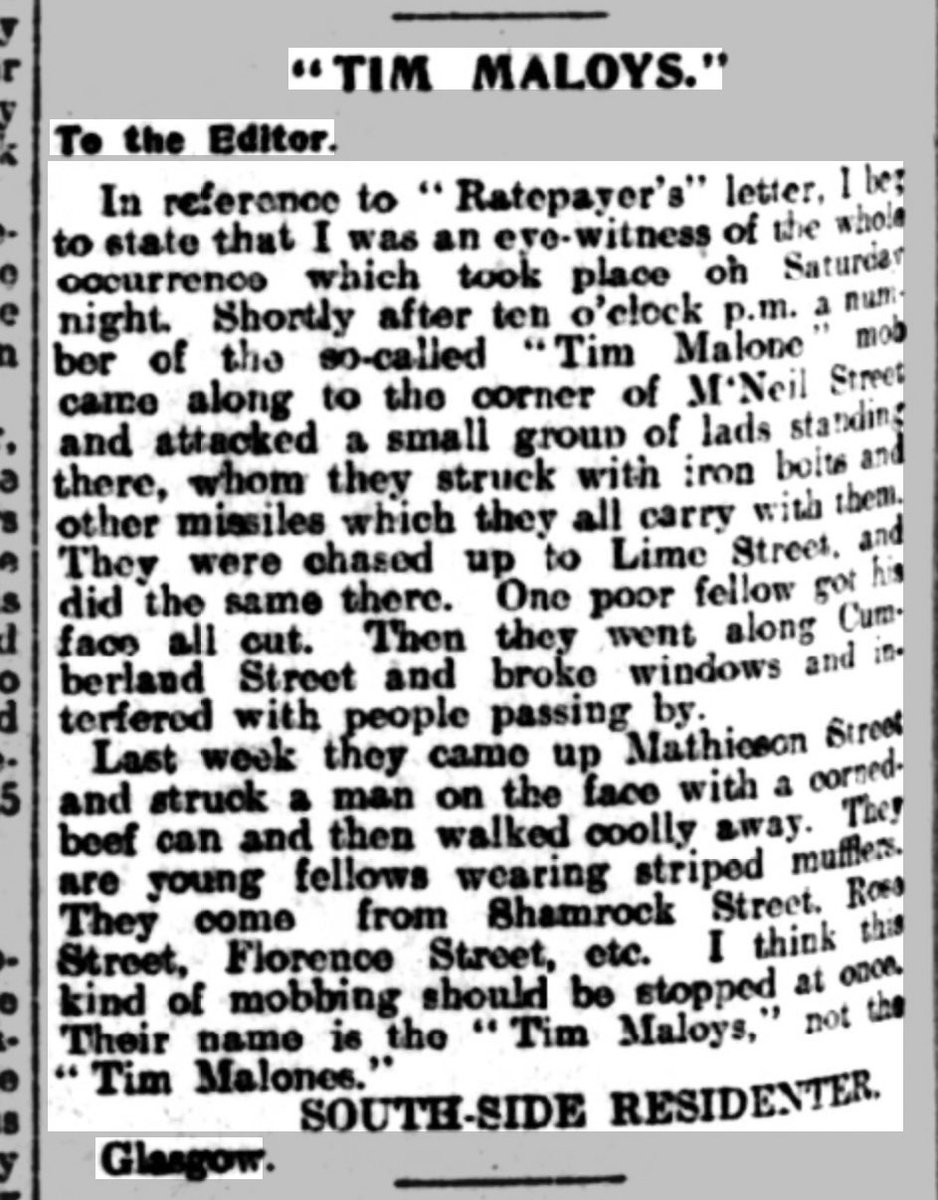
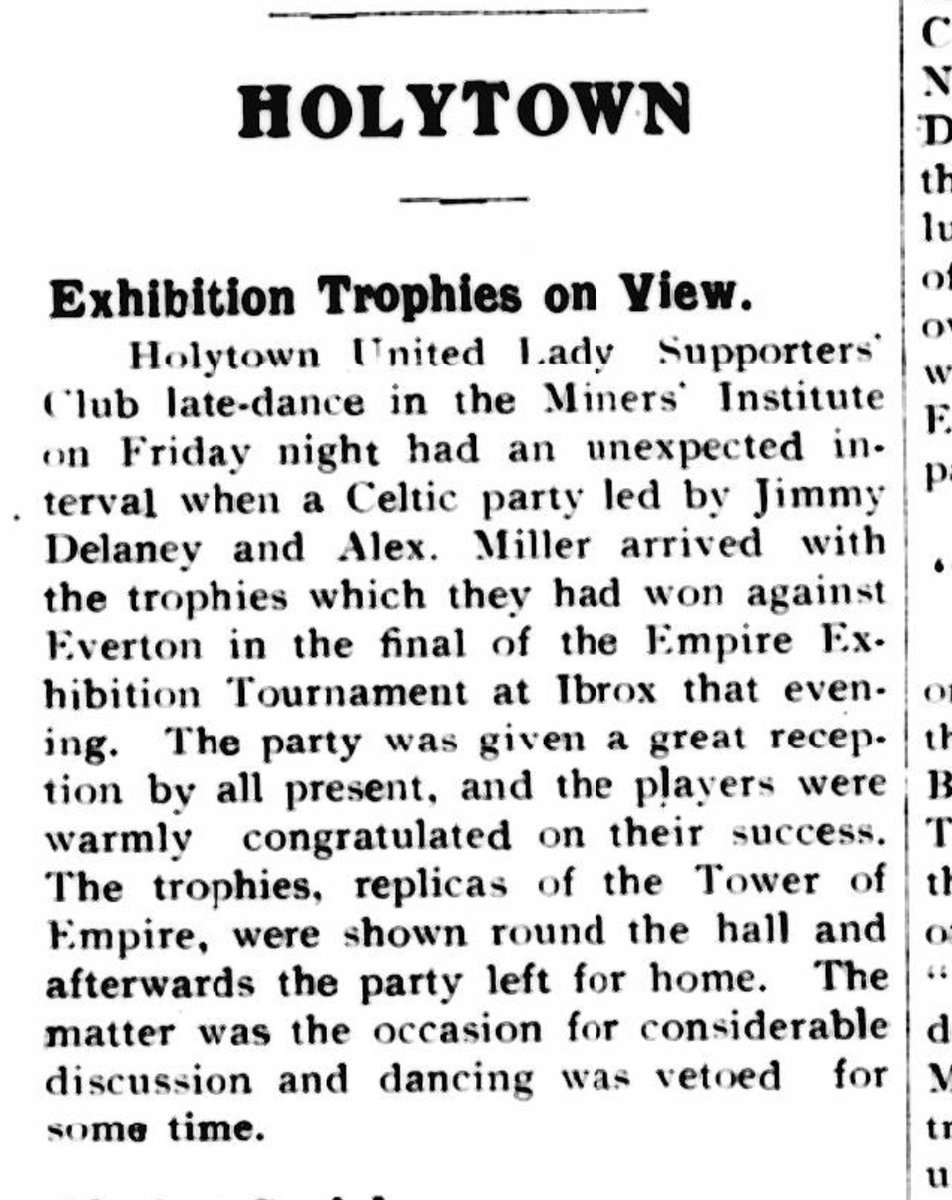
Celtic in the Thirties: Unpublished works of David Potter – Jimmy Delaney
Celtic in the Thirties: Unpublished works of David Potter – Jimmy Delaney
By Editor 26 November, 2024 No Comments
Jimmy Delaney
Celtic Star Jimmy Delaney. Photo The Celtic Wiki
Celtic in the Thirties: Unpublished works of David Potter today features Jimmy Delaney…
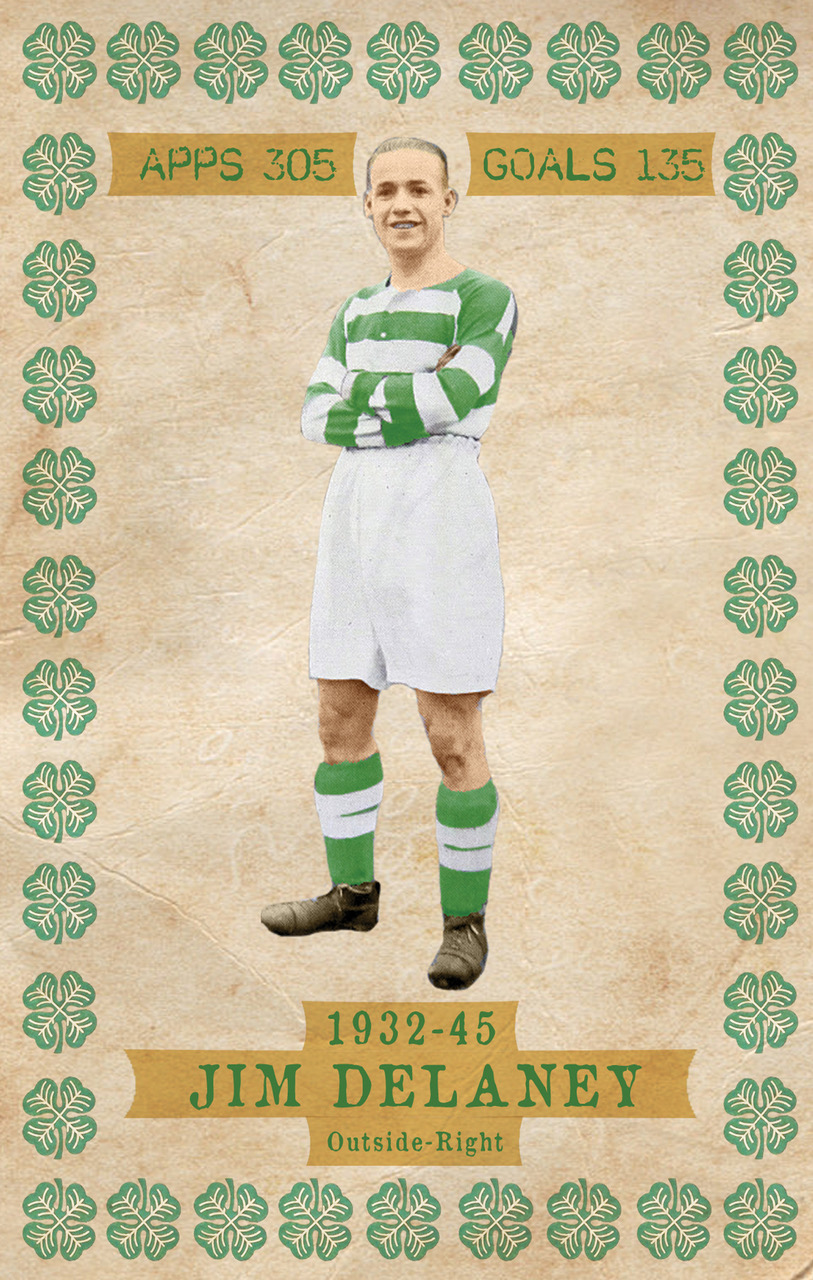
Jimmy Delaney, Celtic in the Thirties by Matt Corr, out now on Celtic Star Books. Image Celtic Curio
Name: JIMMY DELANEY
Born: September 3 1914
Died: September 26 1989
Appearances: 305
Goals: 160
Scottish League medals: 1935/36; 1937/38
Scottish Cup medals: 1936/37
Glasgow Cup medals: 1938/39
Glasgow Charity Cup medals: 1935/36; 1937/38; 1942/43
Scotland Caps: 15

Jimmy Delaney, Celtic Fc. Celtic in the Thirties. Photo The Celtic Wiki
If someone were to write the career of Jimmy Delaney as fiction, it would almost certainly be rejected by the publisher as being too far-fetched. Ronnie Simpson is like this as well. So many unbelievable things happened in Jimmy’s life that frankly it is difficult to believe. For example;
• A cup winner’s medal in three different countries, and a loser’s medal in the fourth
• These three medals were won in three separate decades with a major war in the middle of it all
• Scored two goals against Nazi Germany at Ibrox in October 1936 while, controversially, the Swastika flew overhead
• A broken arm which was not so much broken and shattered into smithereens – and from which he recovered with the bone of a pig!
• The hero of Scotland in April 1946 when he scored the winning goal in the Victory International at Hampden which gave such delight to a nation which had gone through so much
• When playing for Aberdeen at the end of his career, he scored a goal at Parkhead, silencing the crowd – until they realised that it was Jimmy Delaney who had scored it! They then broke into loud applause!
• When he was playing for Falkirk in a Scottish Cup game against Celtic, he was badly fouled by a Celtic defender who was immediately booed by his one crowd for fouling Delaney!
• A man who, in spite of all his success and glory, was frightened to go to Celtic v Rangers games in case they lost! His “stress management strategy” consisted of taking the dog for a walk, and timing his return to coincide with the full time whistle, or sometimes looking for supporters’ buses returning home to get a clue from their demeanour as to who had won!
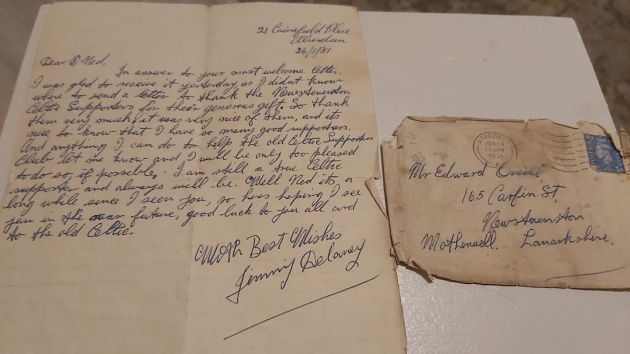
Jimmy Delaney, Celtic in the Thirties by Matt Corr, out now on Celtic Star Books. Image The Celtic Wiki
Jimmy was born in the Celtic mad village of Cleland about a month after the start of World War One. It was clear from an early stage that he was a talented football player, and after a brief spell with Stoneyburn Juniors, he joined Celtic in 1934 and made his debut for the club at the start of the 1934/35 season. Legend has it that one training session was enough to convince Willie Maley that there was talent here. A signing on fee of £20 was agreed, and wages of £2 per week, rising to £4 whenever he reached the first team.
Times were now picking up at Celtic Park. 1935 showed considerable improvement, and 1935/36 was a great season, in many ways because of the boy from Cleland who had speed, ball control and tremendous passing ability. He has fortunate as well in that he had great players round him, and they could all play alongside each other with a particular agreeable ability to interchange positions.
Celtic were particularly fortunate in their wingers, for on the left wing was Frank Murphy, an excellent counter balance to the boy from Cleland who rejoiced in nicknames like “Twinkletoes” “JayDee” and even simply “Baldy” in a reference to his premature loss of follicles.
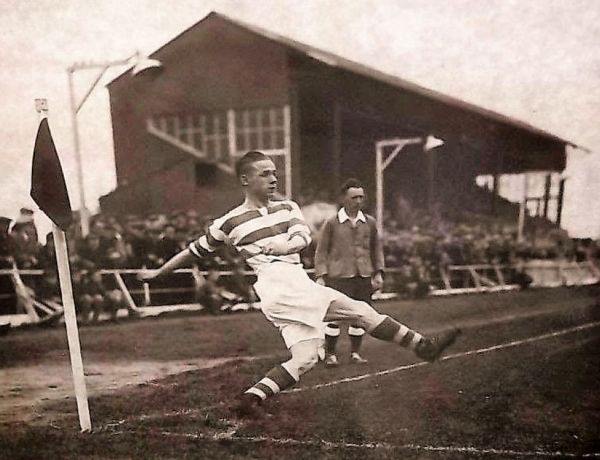
Celtic Star Jimmy Delaney. Photo The Celtic Wiki
The League was won, and it was the year that McGrory scored his 50 goals in a League season, there was so much more than that to be happy about. A reliable defence, a steady midfield and a classy forward line. The supporters were all delighted and one of their songs that year was “Happy Days Are Here Again”. Not everyone however expressed their delight as Delaney himself would have like.
Delaney himself tells the story of the Glasgow Charity Cup final of that year. It had been a thrilling final won 4-2 by Celtic with Delaney scoring a hat-trick. Rightly proud of himself, Delaney came off the field, grinning like the proverbial Cheshire cat being congratulated by all his team mates and even the sporting Rangers players.
He then met Willie Maley in the corridor. Maley was not going to recognise his existence but Delaney decided to force the issue and said something like “Did you enjoy that, Boss?” Maley looked him up and down, and said “Don’t let that go to your head, now” and walked on, although there may have been a twinkle in his eye as well!
Delaney’s good form brought him International recognition. He played against Ireland and Wales in 1936, but, amazingly, was not chosen for the game against England at Wembley. Even more amazingly, his right wing place went to his own Celtic colleague Johnny Crum – an inside left! Of all the crazy selection decisions of the Scotland International Selectors over the years, this one, it was felt, took the biscuit.
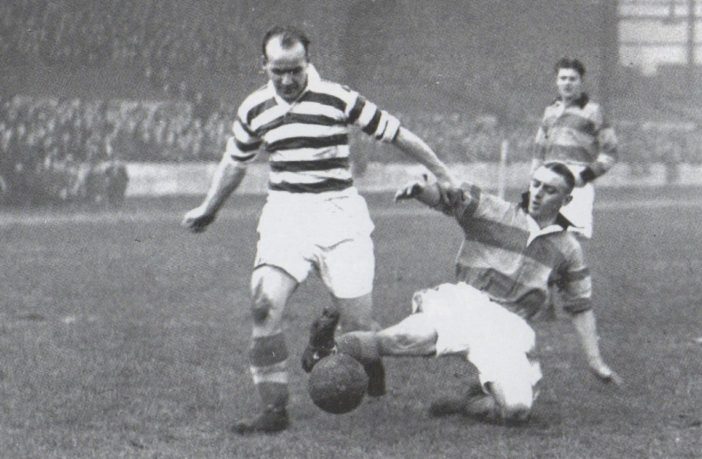
Celtic Star Jimmy Delaney. Photo The Celtic Wiki
But he did play in the somewhat controversial game against Germany in October at Ibrox. Many people felt that Scotland should not have been playing against such opponents who were now playing such an active part in the Spanish Civil War on the Nationalist side, who were already doing so much to reverse the Treaty of Versailles, and who were beginning to persecute their own Jewish population with some ferocity. But Scotland played and beat them 2-0 at Ibrox, and Jimmy Delaney scored both goals!
No record exists of how this news was received in Berchtesgarten or wherever the Fuhrer happened to be living, but it cannot have been well received. Only a few weeks previously the black athlete Jesse Owens had ruined the concept of an Aryan Olympics in Berlin by blowing a hole in any idea of a master race, and now we had a Scoto-Irish Roman Catholic from Cleland in Scotland doing the same!
On 17 April 1937 at Hampden, Scotland beat England 3-1 at Hampden before an International record crowd of 149,145 and a week later on 24 April, 147,365, a record for a domestic fixture, saw Celtic beat Aberdeen 2-1 in the Scottish Cup final. These were the days for attendances! Both figures are disputed and in both cases, there was a fair amount of climbing over the walls! Some people were at both games and insist that there were more at the Scottish Cup final. It matters very little, the important thing being that the “good guys” won in both cases, and one man had the honour of playing in both games. This was Jimmy Delaney.
He didn’t score in either game, but he played a significant part in both. Ex-Celtic Frank O’Donnell now with Preston North End scored once for Scotland and Bob McPhail of Rangers scored twice, and Willie Buchan and Johnny Crum scored for Celtic, but Delaney comes out of both games with a great deal of credit.
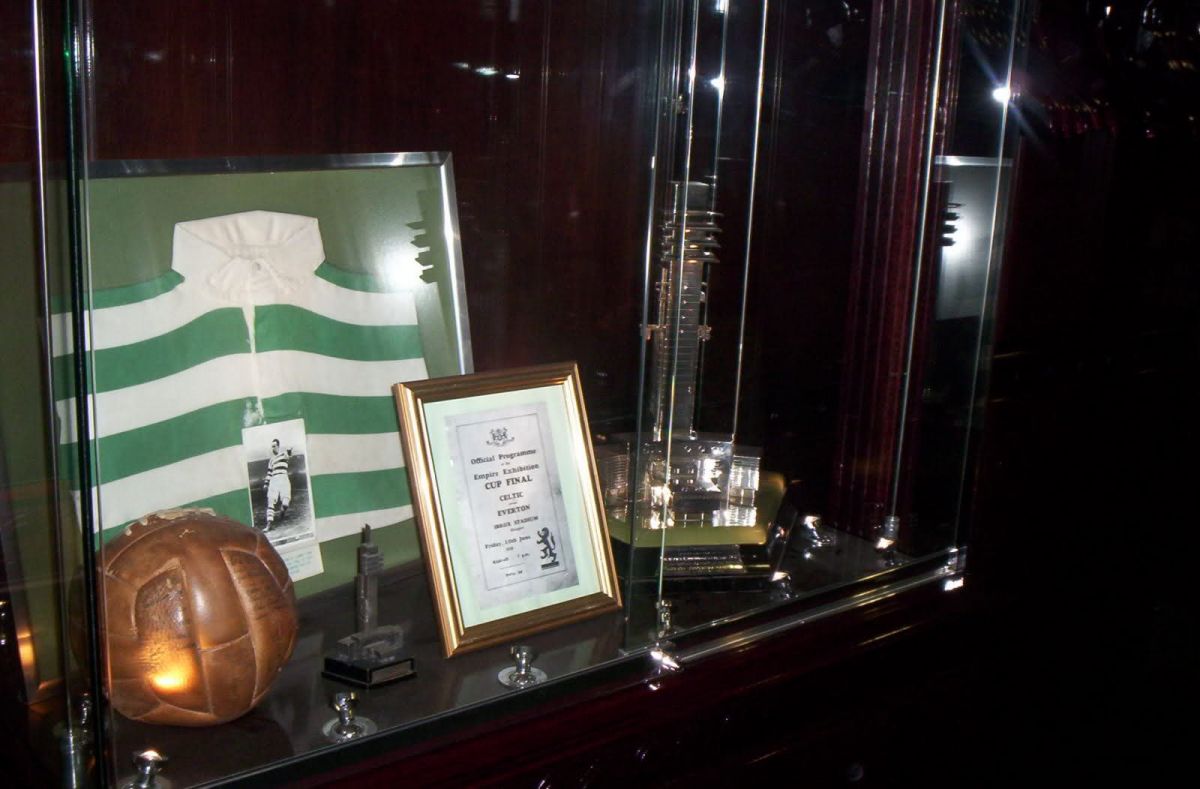
Jimmy Delaney played in the Empire Exhibition Cup final win over Everton . Image The Celtic Wiki
That summer saw Delaney on tour with Scotland drawing 1-1 with Austria and beating Czechoslovakia 3-1 with everyone blissfully unaware that (although, possibly, the more prescient were all too aware) that both these countries were soon to be gobbled up in Hitler’s Germany, but before that could happen there was to be one last great hurrah for Celtic in the shape of a season which saw them win the Scottish League, the Glasgow Charity Cup and the all-British Empire Exhibition Trophy. The last named tournament saw Celtic beat Sunderland and Hearts without the redoubtable Delaney but able to call on his services for the final against Everton.
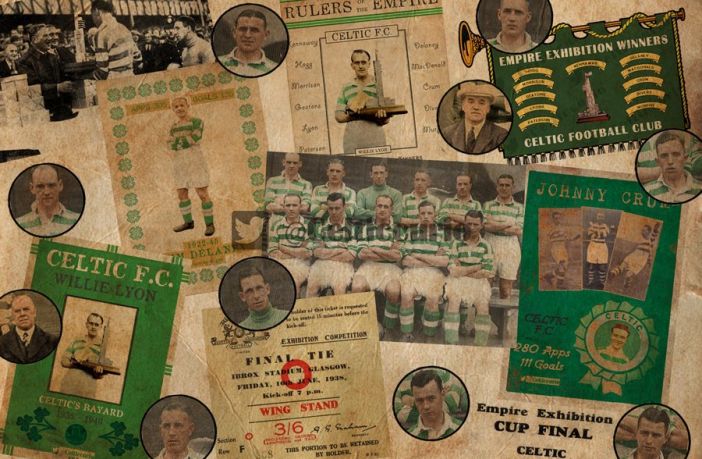
Empire Exhibition Cup, image by Celtic Curio
This made Celtic the indisputable champions of Great Britain, but the next year was not so good. They did win the Glasgow Cup in October 1938, but lost out to Rangers in the Scottish League after a dreadful spell around Christmas and the New Year, and went out of the Scottish Cup to Motherwell at the quarter final stage, the Cup being won this year by Clyde.
But further disaster hit Jimmy on 1st April. It was against Arbroath in a fairly meaningless game (as far as Celtic were concerned, although Arbroath were still involved in a relegation battle) at Celtic Park. Delaney went up for a high ball, fell and as he did do, Arbroath defender Attilio Becci stumbled on top of him and stood on his arm several times, shattering the bone. Becci simply could not help himself and his part in this injury would haunt Becci all his life.
It was a totally shocking injury, so bad that, at one point, amputation was considered. It did not stop Delaney getting married later that summer but it did put him out of the game for two years until 1941. If there was one blessing, it was that it exempted him from military service, and his war related job in Cleland did allow him to pay for Celtic on a Saturday in the difficult circumstances of World War II.
But what a difference in Celtic! Maley had gone, McMenemy had gone, and Jimmy McStay was now in charge. Players had gone, some to the war and a few others to teams like Morton, the Celtic Board being under the misapprehension that men like Johnny Crum were too old. In addition, although many players were available, notably the Celtic daft Matt Busby of Manchester City, because they were stationed in Scotland, the Board refused to take them, compelling Busby for example to go to Hibs.
It was a very poor Celtic team, and although Delaney made a difference when he came back, there were limits to what he could do.
Delaney returned at the start of the 1941/42 season and for a spell at least, there was the dream forward line of Delaney, MacDonald, Crum, Divers and Murphy, but circumstances had changed. In a way, one should not be too hard on players and management in unreal circumstances with serious problems about training, transport and player availability, but nevertheless Rangers seemed to manage it.
Struth was able to get most of his players working in the shipyards or close by in the same way that Maley, at the height of his powers in the First World War, was able to manipulate the situation to his advantage.
The next few seasons are depressing reading. There were the odd moments on triumph eg they won the Glasgow Charity Cup in 1943 which brought a brief smile to a few faces, but general the newspaper reports contain sentences like “Delaney tried his best to coax something out of the team” “Where would Celtic be without Delaney?” and “Celtic are far from the Celts of old”.
It was a thoroughly depressing time, but at least the War was beginning to get better, and Delaney continued to play for Scotland. Tragedy dogged him in the death of his young son Michael (he heard this news after he returned from Hampden where he had been playing for Scotland against England in 1944) but as he himself graciously said, he was hardly the only person struggling at this point.
Peace came in Europe in May 1945 and in the Far East in August 1945, but the 1945/46 season was still an unofficial one, and indeed in most ways, it was as if the war was still on. Jimmy McGrory had now replaced Jimmy McStay as Manager, but there were still no signs of any improvement or even the likelihood of any, and not for the first time, Delaney now 31 and thinking (erroneously) that his best years were behind him, considered his future.
He did not really see any prospects at Parkhead, Jimmy McGrory was a good friend and colleague of his – but Delaney may have had certain qualms about his management ability – and there were a few issues about a benefit game etc.
In January 1946 Matt Busby (who probably would have wanted the Celtic job but was now the Manager of Manchester United) came in with an offer for Delaney. The Celtic Board would, of course, have taken any money, but a more serious issue would have been Delaney himself, reluctant to leave Cleland, his family and of course Celtic.
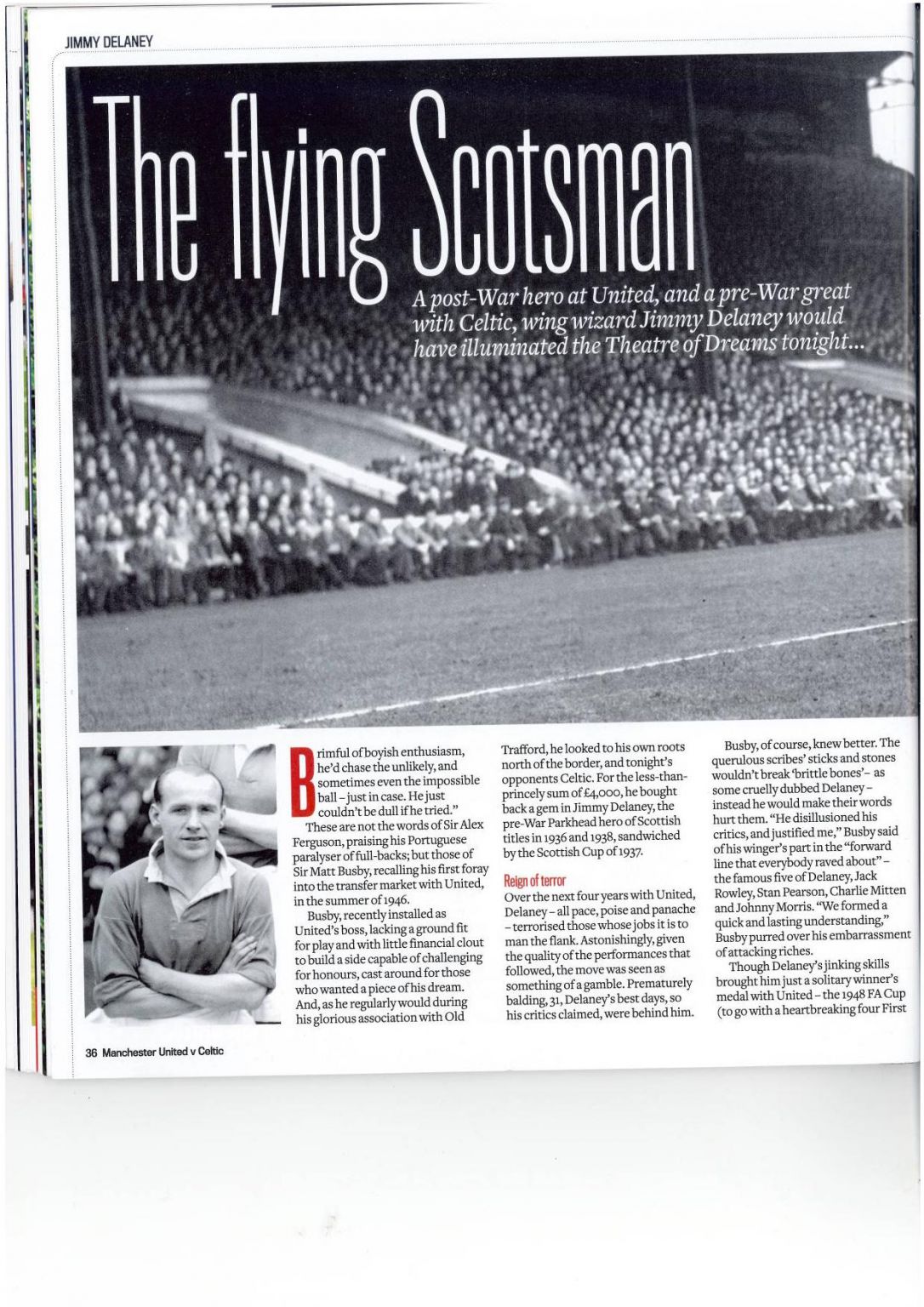
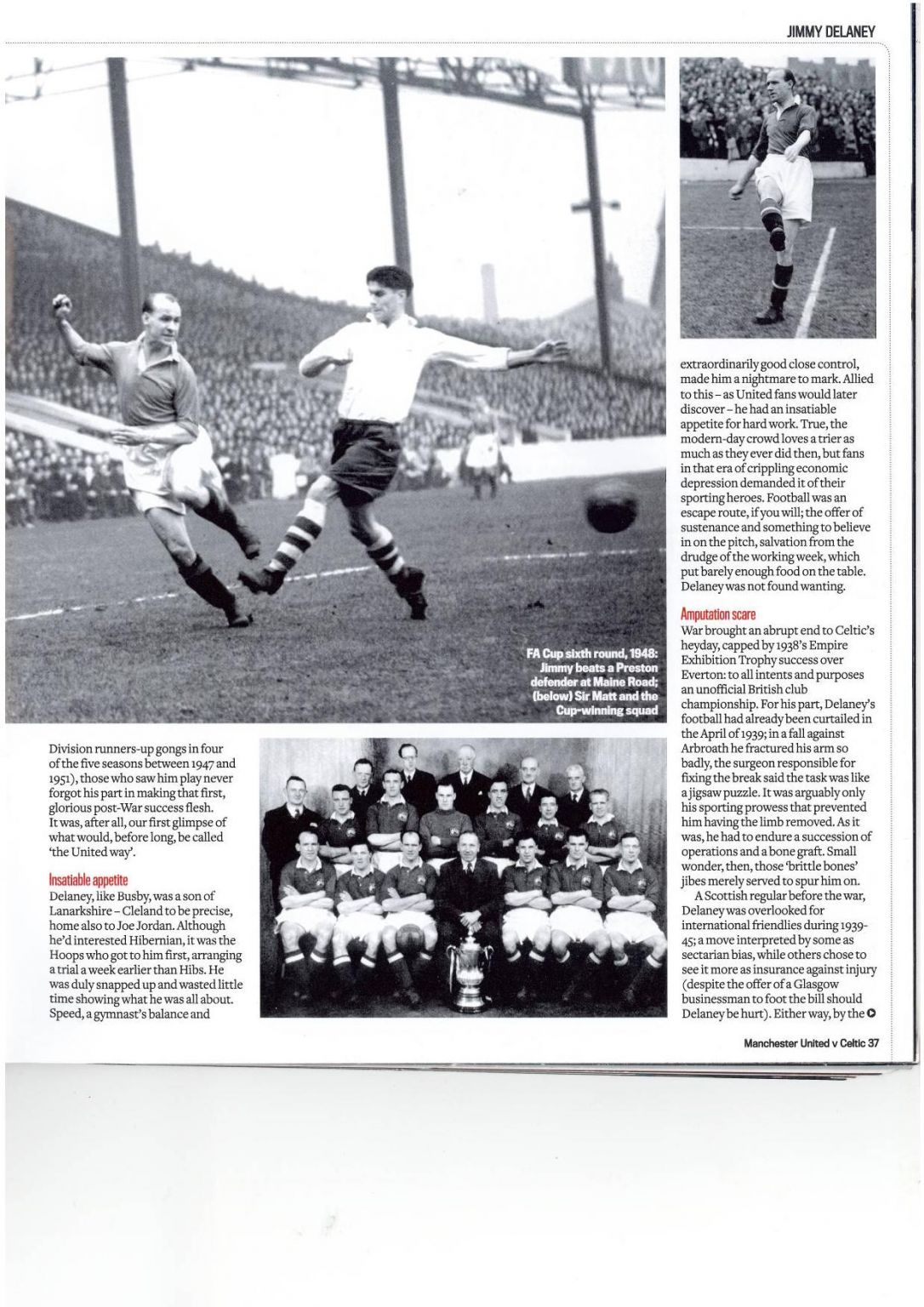
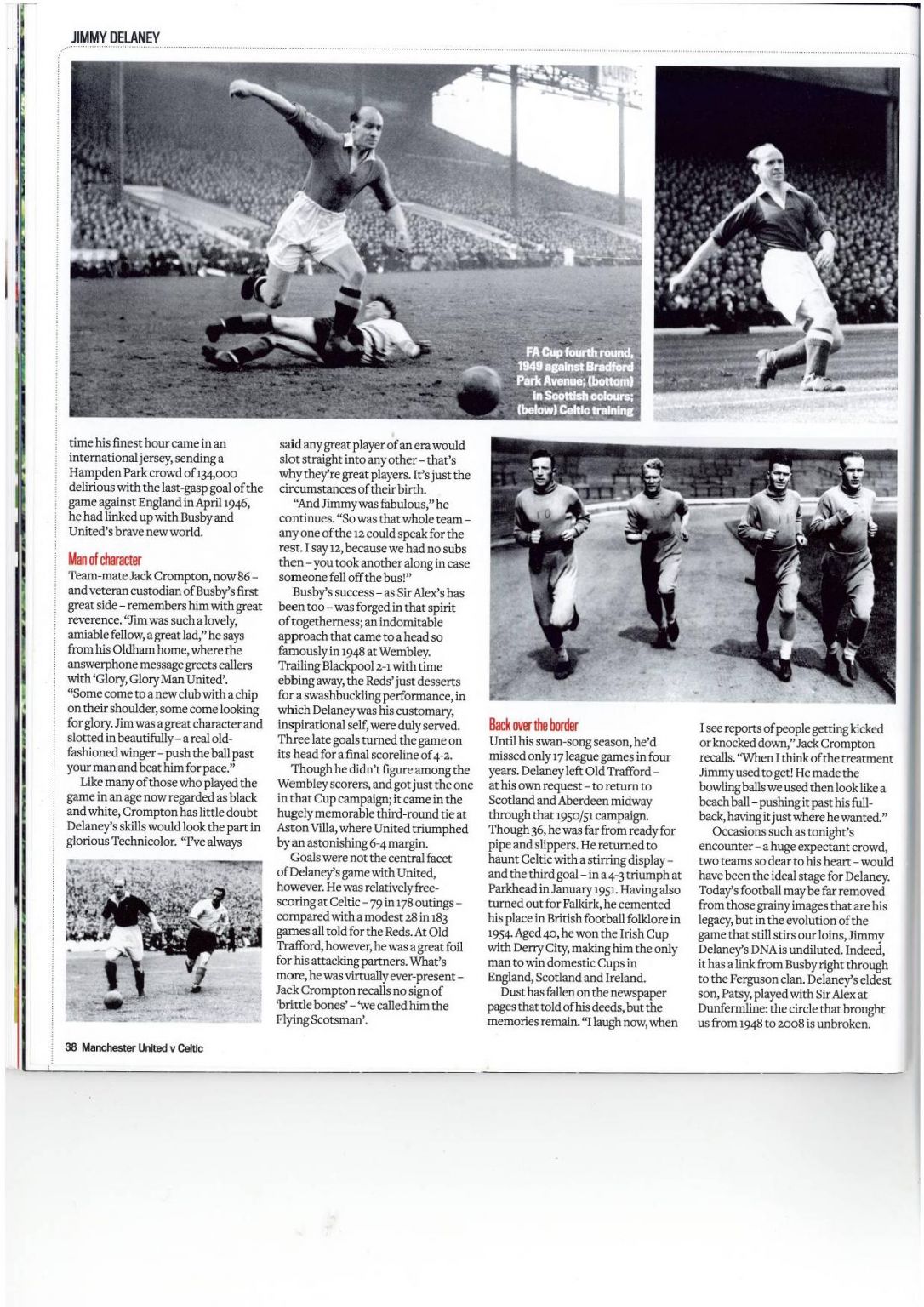
But Busby did seem to offer the prospect of success and a sort of “Celtic-in-exile” (he would do likewise with Pat Crerand in 1963), and Delaney, to the distress of Celtic supporters everywhere including those being demobbed at this very time, went south.
Manchester United in 1946 were a far cry from the multi-national business that they are now. They did not even have a home, for Old Trafford had been badly damaged by the Luftwaffe and were obliged to share Maine Road with their rivals Manchester City. They had been a good side before the Great War, but they had failed to land a single major honour since 1911.
They were indeed the under-performing club with the large support who expected a lot more, and the recently appointed Matt Busby had a major job on his hands. One of his first steps was Jimmy Delaney.
But before he really got started at Manchester United, there came the moment which in some ways defined his career. It could hardly have been a more high profile game. The Victory International at Hampden on 13 April 1946 was already being talked about on the ships and the trains among discharged soldiers and sailors, in many cases, months before the game.
Scotland had tended to lose to England more often than not in war-time Internationals and it was time to right the balance.
One cannot vouch 100% for the accuracy of the story of how the sausages were listening to the radio and stood up in the frying pan to greet Delaney’s last minute goal, but it would have been typical of how the goal was received in the deprived but heroic nation that Scotland was.
89 minutes had now gone, and Scotland were attacking the Mount Florida End. A free kick from Jackie Husband on the left found Willie Waddell on the right and Willie sent it back to the onrushing Delaney who finished the job. 1-0 for Scotland, and Delaney was immediately elevated to the level of the divine.
But it was hard work building up Manchester United. Liverpool won the English League in 1947 and Arsenal in 1948. The English Cup went to Charlton Athletic for the first time in 1947, but Manchester United forced their way through to the Final in 1948 to play against Stanley Matthews’ Blackpool. Everyone loved Stan Matthews, and everyone wanted Blackpool to win, but in what was claimed to have been one of the better Cup finals of them all, it was Manchester United who won 4-2, and Delaney now had two Cup medals, one Scottish and one English.
In 1950 Delaney returned to Scotland. Now 36 and prone to injuries, he was beginning to feel that his career was coming to an end, and he was wanting to go home. Celtic missed yet another trick by not making an approach for him. He would have loved to go there, but he settled for Aberdeen, a city which loved him after seeing so many good performances there from him for Celtic and indeed for Scotland.
Aberdeen were a decent team, having won the Cup in 1947 and Delaney gave them a season and a half’s great effort, including one funny incident at Celtic Park in January 1951 when in a close and even game, when he scored a great goal.
The goal was greeted with stony, sullen silence punctuated by a few cries of criticism at their defenders for allowing this to happen, when the penny dropped in the 60,000 crowd that the goal had been scored by Jimmy Delaney! The unhappy desolation was replaced by loud cheers as more and more supporters realised the identity of the scorer.
In late 1951 he moved on, this time to Second Division Falkirk. His first game for the Bairns was at Station Park, Forfar. We had the bizarre spectacle of the bigger than usual crowd waiting to see the way the teams were playing, then gathering in large numbers near Falkirk’s right wing, the better to observe the legendary Jimmy Delaney.
In 1953 in a Scottish Cup tie at Brockville made famous for Charlie Tully’s twice taken corner kick, Frank Meechan, Celtic’s left back saw fit to bring down and injure Jimmy Delaney early in the game. Frank, a bhoy from Croy might well have expected the disapproval of the Falkirk crowd, and cannot have been too surprised at his wigging from the referee.
He did not however expect to be booed by his own crowd! Early in the second half, Charlie Tully did the same, and he too got the treatment from those who idolised him. This was no way to treat Jimmy Delaney!
In season 1953/54 he crossed the Irish Sea to play for Derry City, and it was there on May 10 1954 that he picked up his third Cup medal when Derry City beat Glentoran in the second replay of the Cup final. The news of this feat was greeted with great enthusiasm in Scotland, for 1954 had been a great year for Celtic as well with a League and Cup double.
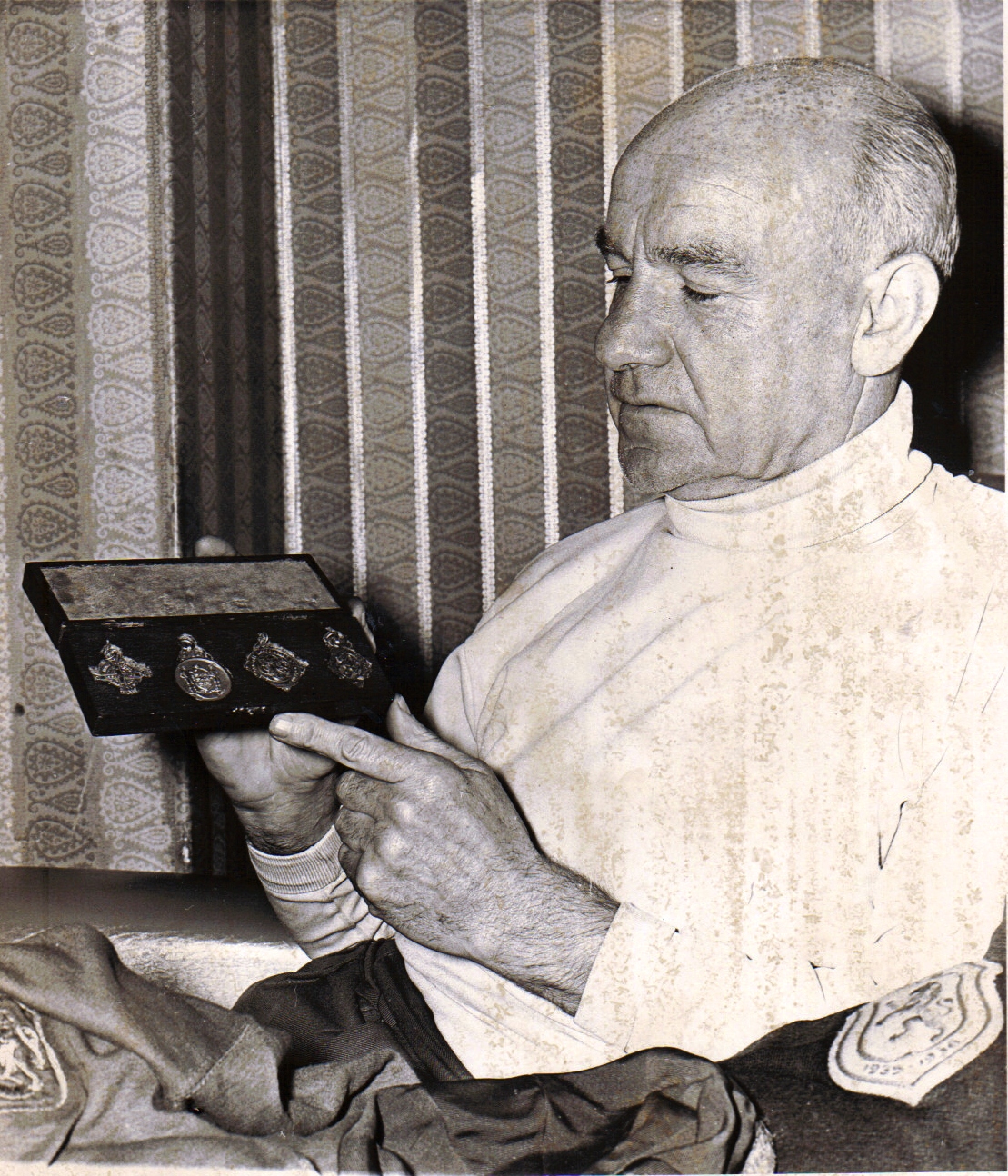
Jimmy Delaney with his medals. Photo The Celtic Wiki
It might have been four Cup medals for Delaney, for he then went down south to play for Cork Athletic and they reached the FAI Cup final in 1956, but sadly lost out to Shamrock Rovers in the final, so Jimmy picked up his first loser’s Cup final medal to go along with three winner’s medals.
He finished his career back in Scotland playing for Elgin City, and then returned to Cleland where he spent the rest of his life, being seen often in the stand at Celtic Park and being easily distinguishable by his bad head! He was not the best supporter in the world, however, and his family often wondered how he was able to play for Celtic when having to watch them could often reduce him to quivering jelly!
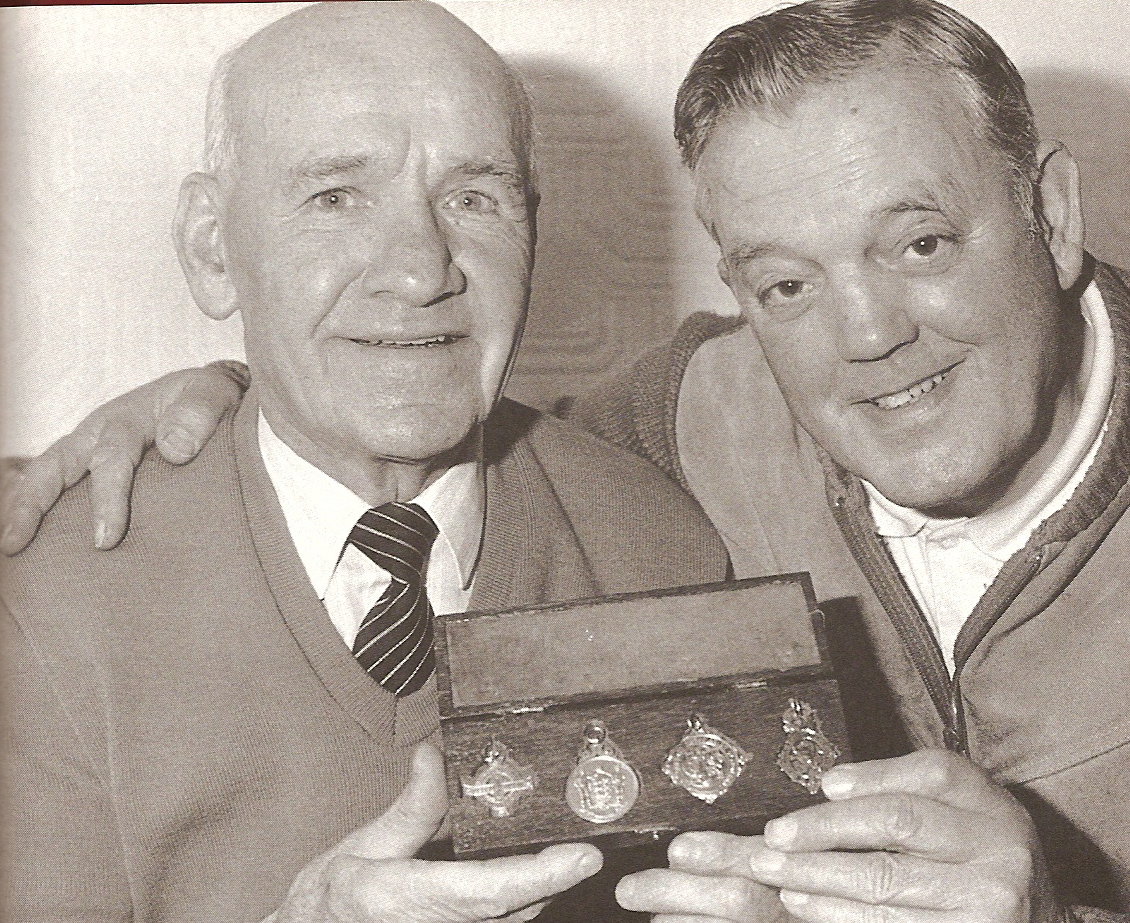
Jimmy Delaney with his medals. Photo The Celtic Wiki
In particular he found listening to the radio very difficult. His beloved dog Brandy would be taken for a walk timed to end just as the game was likely to end so that he would not have to listen to hysterical commentators! Alternatively, he would stay away and look at returning supporters’ buses and trying to get an indication from their demeanour of how the game had gone!
He died on 26 September 1989. The following night Celtic played at Celtic Park against Partizan Belgrade. It is to the eternal shame of Celtic FC (but then again possibly typical of those who ran the club at this time) that there was no official remembrance of Jimmy Delaney.
David Potter



![[Untitled] [Untitled]](https://wikifoundryimages.s3.amazonaws.com/c1a6e16570b947ed0d67897926359996)
